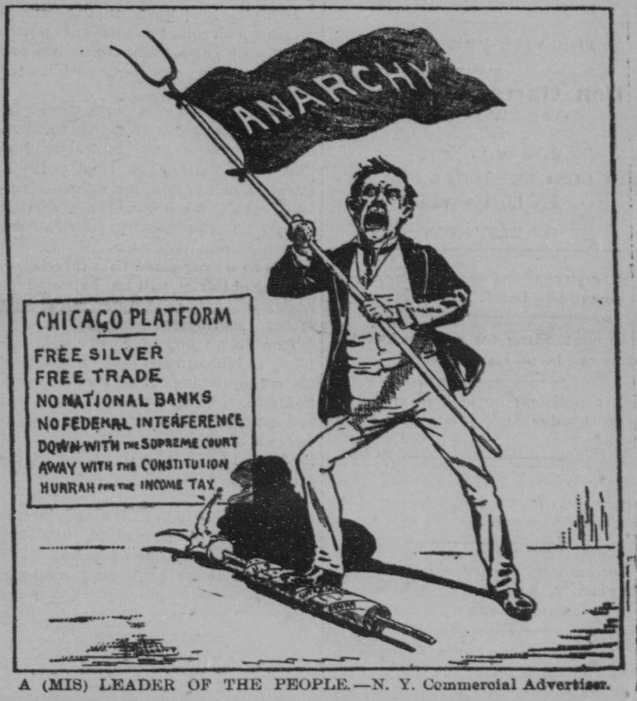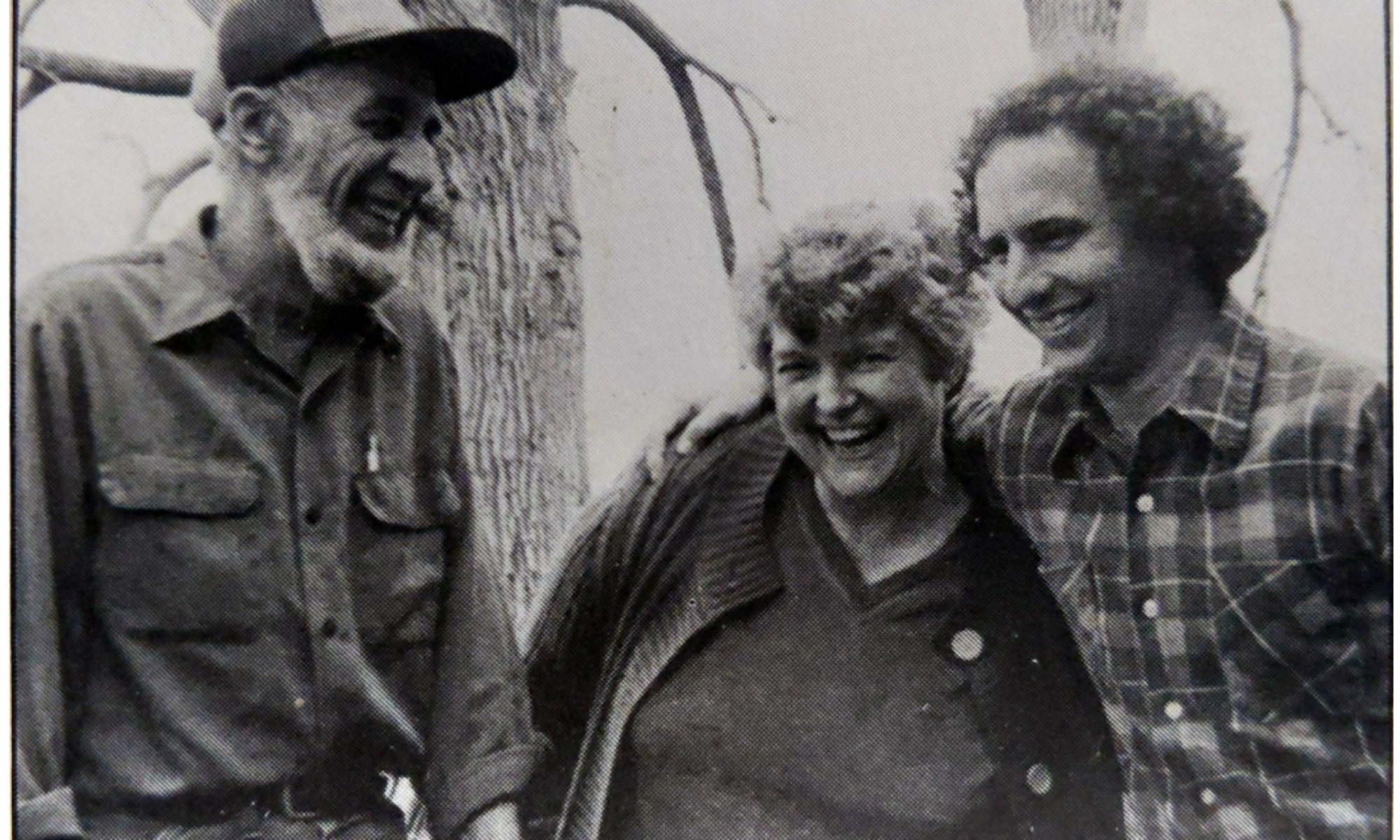Over three decades removed from emancipation, in 1896 African-Americans began to move out of virtually one-party allegiance toward the Republican Party and consider allying themselves with the Democratic Party. Why?
I am studying African-Americans’ role in the election of 1896, because I want to find out who supported William Jennings Bryan and why, in order to understand African-Americans’ relationship to populism and the Democratic Party of the 19th century.

That cartoon, on the whole, makes a lot of sense, right? African-Americans voted for Republicans in overwhelming majorities after Reconstruction, as Abraham Lincoln’s party was the one which emancipated so many of them. Pretty standard, textbook stuff.
But then we take a look at this:

That’s…different. In particular, that man, George Taylor, argues that while only 15% of African-Americans lived (in 1896) in what he called the “Mississippi Valley,” they represented a substantial voting bloc which was fed up with policies like the gold standard and tariffs supporting the moneyed interests of the East.
So we’ve got two opposite political planks, being articulated by African-Americans, on the same subject. Why?
Well, so far I don’t know. But I’m thinking Taylor might’ve been onto something–region and occupation may well have something to do with blacks’ political preferences in the election of 1896.
The sources I’ve loaded into my Omeka page reflect those disparities and, in the coming weeks, will hopefully expand to provide a wider picture of the 1896 election. Using the Daniel Murray collection of African-American pamphlets, the Library of Congress Chronicling America project, Slave Narratives from the Federal Writers’ Project, and perhaps electoral data if I can get my hands on it, I want to chart the 1896 election to show (1) where African-Americans were articulating political thoughts, (2) what those thoughts were, and (3) if there are any regional or socioeconomic factors which contributed to those thoughts.
A Brief Bibliography:
Adam, Anthony J. Black Populism in the United States: An Annotated Bibliography, Westport, CT: Praeger, 2004.
Ali, Omar H. In the Balance of Power: Independent Black Politics and Third Party Movements in the United States, Athens: Ohio University Press, 2008.
Ali, Omar H. In the Lion’s Mouth: Black Populism in the New South, 1886-1900. Jackson: University Press of Mississippi, 2010.
Gaither, Gerald H. Blacks and the Populist Movement: Ballots and Bigotry in the New South. Tuscaloosa, Ala: University of Alabama Press, 2005. Second edition.
Goodwyn, Lawrence. The Populist Moment: A Short History of the Agrarian Revolt in America. New York: Oxford University Press, 1978.
Hahn, Steven. A Nation Under Our Feet: Black Political Struggles in the Rural South from Slavery to the Great Migration. Cambridge: Harvard University Press, 2003.
Harpine, William D. “Playing to the Press in McKinley’s Front Porch Campaign: The Early Weeks of a Nineteenth-Century Pseudo-Event.” Rhetoric Society Quarterly 30, no. 3 (2000): 73-90. http://www.jstor.org/stable/3886055.
Ostler, Jeffrey. Prairie Populism: the Fate of Agrarian Radicalism in Kansas, Nebraska, and Iowa, 1880-1892. Lawrence, Kan: University Press of Kansas, 1993.
Postel, Charles. The Populist Vision. New York: Oxford University Press, 2007.
Sipress, Joel. “A Narrowing of Vision: Hardy L. Brian and the Fate of Louisiana Populism.” The Journal of the Gilded Age and Progressive Era 7, no. 1 (2008): 43-67. http://www.jstor.org/stable/25144508.
Wang, Xi. The Trial of Democracy: Black Suffrage and Northern Republicans, 1860-1910. Athens: University of Georgia Press, 1997.
So far I’m not quite sure what I’m going to do with Omeka. It provides a place to catalog a bunch of sources, but as an item-based content management system, I don’t think I’d be posting any of my items in my actual dissertation research to it.
Perhaps this is the tribalism I’ve felt in the world of research and academic publishing. The moment I put something out there that’s a source, someone can grab it and do their own work with it, possibly scooping me in the process. Grad school has been really good at putting “The Fear” in me that someone else will publish my research first, and because I know I’m using sources and materials that no academic has seen, touched, or possibly even known existed, I don’t want those things getting out there. Maybe the Public/Private function is reason enough to do that. I don’t know (right now in my studies) that the amount of time spent justifies the work.
The Klement Lecture
Last week at our Klement Lecture, Dr. Stephen Berry of the University of Georgia gave a talk entitled “Drinking Yourself to Death in the Grand Age of Temperance: Edgar Allan Poe and the Art of Self-Destruction.” The talk aside (which was extremely interesting), my favorite parts of visiting scholars are the opportunities the department gives graduate students for a “meet and greet.” Since Dr. Berry has done work on CSI: Dixie and Marquette is in the midst of a yearlong “Digital Humanities for evvvveryone!” kick, many of us had questions about that project and the field of Digital Humanities as a whole.
Along with his emphasis on “Form follows function” (let your research determine your need for certain aspects of DH), Dr. Berry also gave a very illuminating answer to a question about why most DH projects are a scholar’s second or–more often–third project (usually after they’ve received tenure). He noted not only a lack of literacy on the part of departments to learn what the value of a digital project is, but an academic system of publishing and producing research which often made it impractical for graduate students to actually commit to DH. While he argued that he was obviously in favor of increasing digital scholarship among graduate students, he sympathized with the difficulty faced by graduate students and junior faculty in doing DH work if it was not properly rewarded.
Of course that’s not to say any one person has the answer or that there aren’t programs which actively reward DH; more programs figuring it out and pushing it appropriately would certainly sweeten the pot for the rest of us, though.

